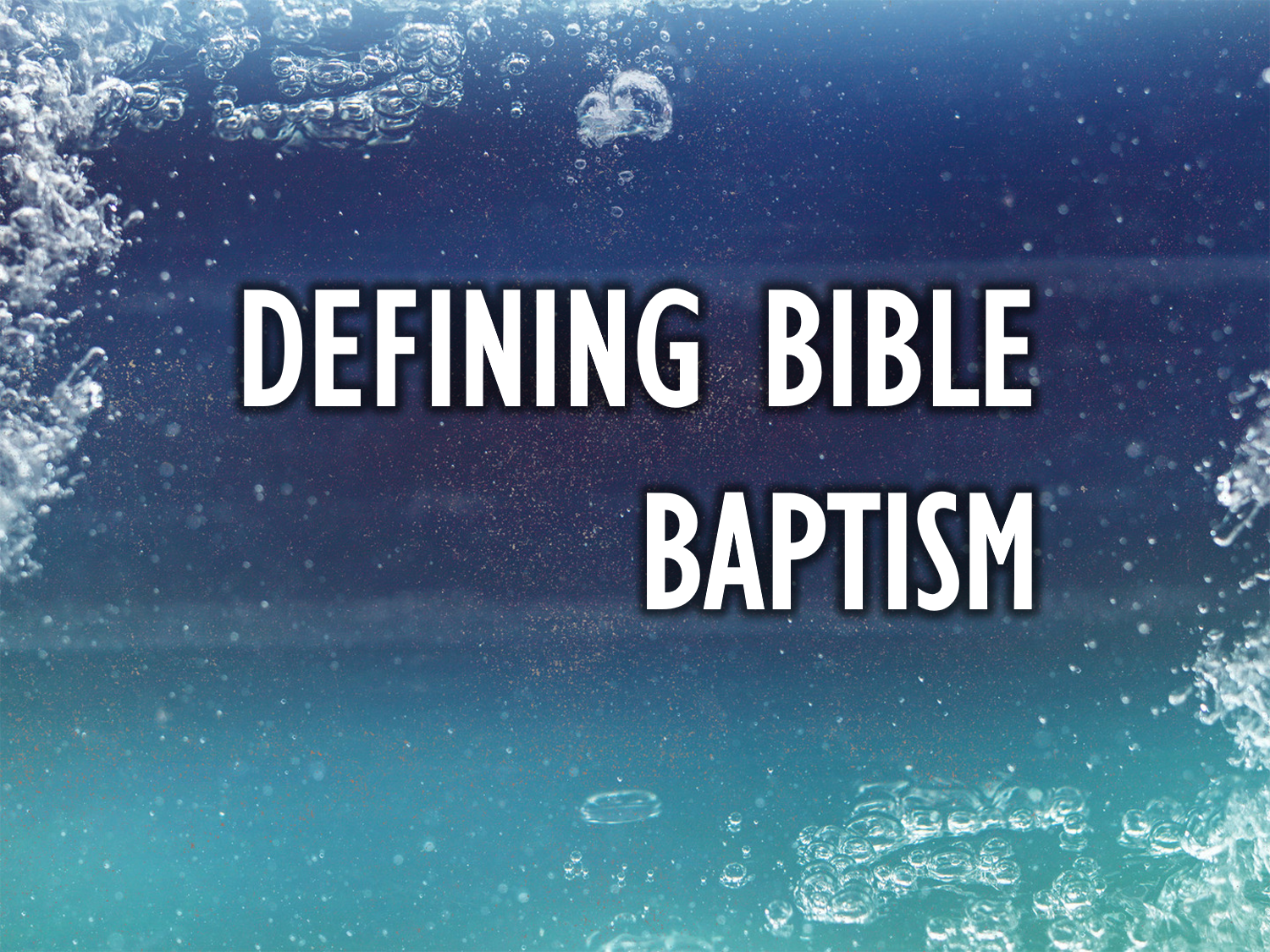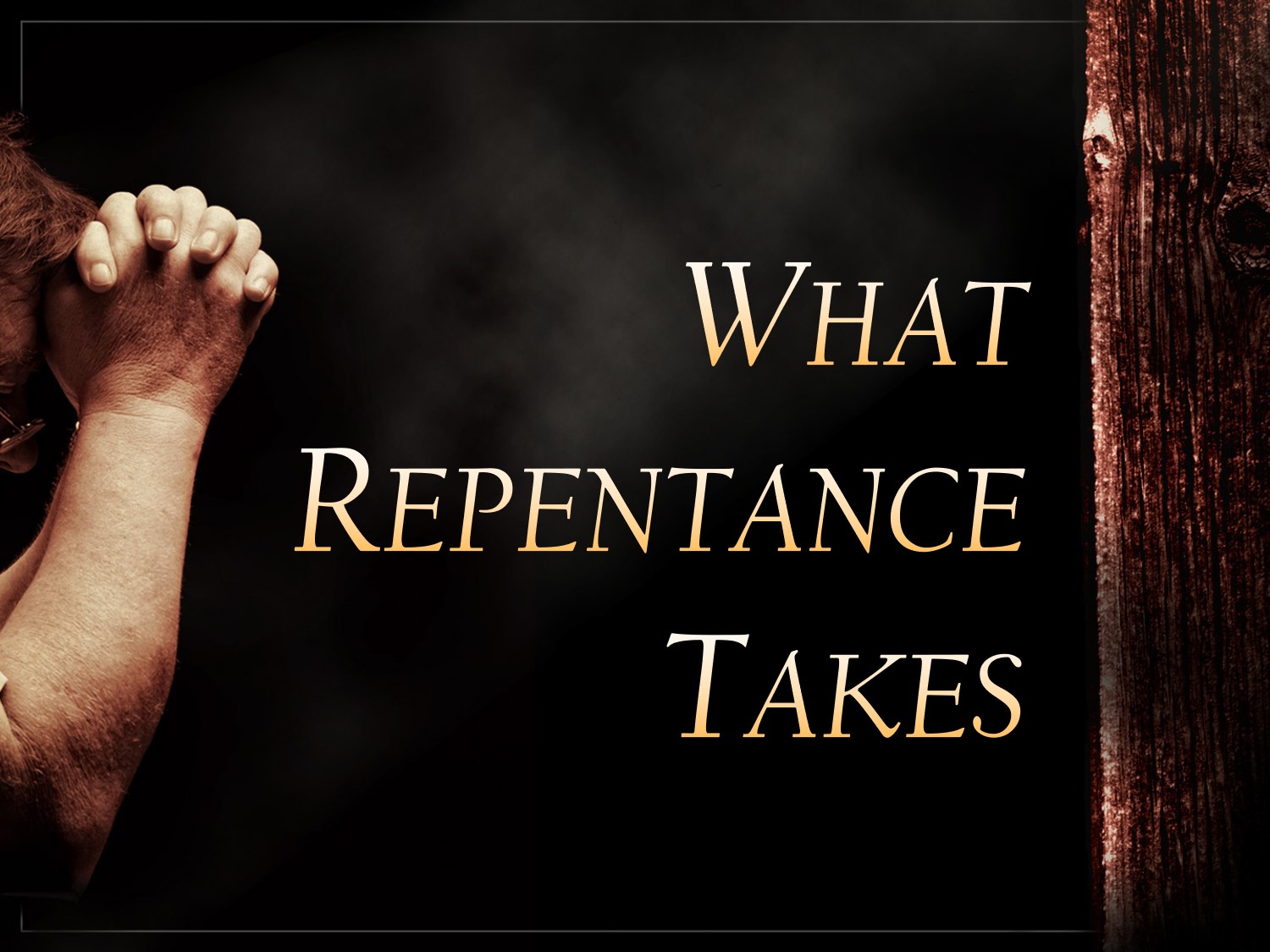Blog
Defining Bible Baptism
Wednesday, April 17, 2019

To say that there is confusion in the religious world about baptism would be an understatement! Probably all of us have had friends who talked about how a new baby in their family got baptized. There are churches not far from here that baptize people to admit them into church membership. There are even those who believe that they still receive the baptism of the Holy Spirit today.
All of this confusion stands in direct contradiction to the teaching of the Bible. In Ephesians 4:5, Paul tells us that there is one baptism. Belief in and acceptance of that one baptism is one of the things that is supposed to unite all believers. Unless the Holy Spirit is just messing with us, Ephesians 4:5 means that only one view on baptism is right and all the others are wrong.
What is that one baptism? This is a question of eternal significance, and unless we can persuade others to choose the right baptism, there is no hope for them. For our sixth half-hour study, then, let’s consider the definition of Bible baptism.
First, Bible baptism is IMMERSION IN WATER. By no means is this universally accepted! Though many churches teach baptism by immersion, many others insist that pouring or even sprinkling water over the baptizee is sufficient. What can we say to people who believe this?
Many of you have probably heard before that the word “baptize” is a transliteration of the Greek word baptizō, which means “to immerse”, so that sprinkling and pouring are excluded by definition. All that is certainly true, but when we’re studying with others, I don’t think that’s the best argument to use.
Here’s why. In order for somebody to become a disciple, they have to hear the gospel and understand it for themselves. Their faith has to be in the word, not in us. However, almost nobody we study with will have any knowledge of Greek. They don’t have the tools to evaluate the baptizō argument. Either they take our word for it, or they don’t. In either case, we’ve taken the focus off the word and put it on us, where it doesn’t belong.
Instead, I think it’s better to take people to Acts 8:38-39. Here, we can see from the English what baptism is. Philip and the eunuch go down into the water, and they come up out of the water. That doesn’t happen when you sprinkle. That doesn’t happen when you pour. It only happens when you immerse.
There are other places in Scripture that imply that baptism is immersion. In John 3, when John is baptizing at Aenon near Salim, the text tells us that he’s doing it there because water is plentiful there. You don’t need plentiful water to sprinkle or pour. You only need plentiful water to immerse.
On the other hand, there is nothing in Scripture that says or even implies that God’s people sprinkled or poured as a method of baptism. Indeed, neither one of those was developed until hundreds of years after the time of the Bible. Those who sprinkle or pour are not following the New Testament pattern, so they can’t expect the New Testament blessing either.
Second, Bible baptism is the baptism OF A BELIEVER. To us, this seems like a duh point. Who else would you baptize, if not someone who believes in Jesus? However, this point is disputed by everyone who accepts infant baptism as a valid form of baptism. Clearly, the infant being baptized doesn’t know Jesus from a hole in the ground, yet they are being baptized anyway, even though generally they would prefer not to be. I’ve never yet seen a picture of a “baptized” infant where the infant looks happy about getting water dumped on them!
Those who practice infant baptism say that it is necessary in order to cleanse the infant from the sin they inherited from Adam. There are problems with that claim, and we’ll talk about them several weeks from now. For now, though, it’s enough to point out that those who are baptized in the New Testament are always believers. For evidence of this, let’s look at Colossians 2:11-12.
I like to use this verse when studying with people who believe in infant baptism because it is often a verse that they themselves will bring up if they know their Bibles. Here’s why. Notice that in v.11, Paul compares baptism to circumcision. Of course under the law, infant boys were circumcised, so the infant-baptism people will take that and argue that infants should be baptized too.
Well, no. The problem is that they pay so much attention to v. 11 that they don’t pay attention to the wording of v. 12. Paul says there that the Colossians were buried with Christ in baptism—there’s another immersion passage if you need one—and then goes on to say that they were raised. How? They were raised through faith in the powerful working of God.
You see it, brethren? The essential element in the spiritual resurrection of baptism is faith. If we do not believe that God raised Jesus from the dead and will raise us, our baptism is ineffective. Rather than teaching that non-believers can be baptized, this passage teaches that only believers can be.
Finally, the purpose of Bible baptism is TO WASH AWAY SINS. Look at Acts 22:16. This is about as simple as it gets. Ananias tells Saul to arise, be baptized, and wash away his sins. Therefore, if you want to wash away your sins, you have to be baptized. Plain as day, right?
Sadly, no. There are all kinds of people who take the many passages that plainly state baptism is necessary for salvation, and they distort them around to say the opposite. My personal favorite go-to site for false doctrine on baptism is gotquestions.org. Here, among other things, is what it has to say about Acts 22:16:
“Concerning the words, ‘be baptized, and wash away your sins,’ because Paul was already cleansed spiritually at the time Christ appeared to him, these words must refer to the symbolism of baptism. Baptism is a picture of God’s inner work of washing away sin (1 Corinthians 6:11; 1 Peter 3:21).”
Many of you have heard me say, “Watch out for people who teach, ‘The text doesn’t say what it says,’” and this a prime example. Ananias tells Paul that he needs to have his sins washed away. Gotquestions.org tells us that Paul already has been cleansed. Who are you going to believe, Ananias or gotquestions.org?
At the same time, though, not everything in this quotation is wrong. Baptism is symbolic. When we are baptized, the water does not literally wash the sin off our skin. As Peter says, baptism is not the removal of dirt from the flesh. It is the appeal to God for a good conscience.
Nobody has their sins washed away by accident. Baptism only saves those who come to the water in search of salvation. Otherwise, we might as well set a trap on Nashville Highway and forcibly baptize everyone we catch! People who are saved through baptism have to know they’re not right with God and want to get right with God. However, everyone who is baptized with that mindset will find what they’re looking for.
What Repentance Takes
Tuesday, April 16, 2019

Several weeks ago, when Shawn and I were teaching the evangelism class together, both of us observed that the biggest problem we had encountered in teaching others the gospel wasn’t resistance on baptism. Instead, it was resistance to repentance. Both of us have known far too many people who didn’t want to submit their lives to the will of God.
If we’re going to be effective in studying with others, then, we’re going to have to know how to teach them about repentance. During the sermon last week, we saw that repentance is necessary to salvation. This week, we’re going to explore what repentance takes.
In order to do this, we must begin with DEFINING REPENTANCE. To help us with this, let’s consider Acts 26:19-20. Here, Paul explains his work as a preacher. In particular, he touches on two things he taught others. He told them a), to repent, and b), to perform deeds in keeping with repentance.
This is important because a lot of the time, we want to lump a) and b) together. We want to say that repentance is not only a change of heart, but a change of life. Scripturally speaking, that’s not true. The Greek word for “repentance” is metanoia, which means rethinking or changing one’s mind.
As a result, somebody who wants to be saved does not have to get their lives in order before they get baptized. Think about it. How could we expect somebody else to defeat sin without the Lord’s help when we ourselves rely on that help every day? And yet, if we demand that somebody reform before we’re willing to baptize them, that’s what we’re demanding. It doesn’t make a lick of sense.
However, they do need to repent. They do need to make a sincere commitment to changing their lives. If I don’t believe that somebody I’m studying with sincerely wants to change, I won’t baptize them. They haven’t met the requirements.
Of course, not everyone who repents follows through on that commitment. I’ve baptized all too many people who fell away, sometimes only a few days after I baptized them. Such people are certainly lost. However, they are not lost because they failed to repent. They are lost because they did not perform deeds in keeping with repentance.
If that’s what repentance is, what leads people to repent? What causes them to make this decision to change? First, they need KNOWLEDGE OF GOD’S WILL. Along these lines, consider Nathan’s confrontation with David’s sin in 2 Samuel 12:7-9. Notice that Nathan doesn’t begin by talking about all the things that David is doing right. He doesn’t talk about David’s honesty as a king or his faithfulness in worshiping God. Instead, he directs David’s attention to the part of God’s will that David is not following.
If we want to lead someone else to repentance, we have to tell them that they’re doing wrong. This is not fun. None of us like to teach somebody that they must change their lives if they want to please God, particularly if the change is dramatic. Some of the most painful conversations I’ve ever had have been when I had to tell a married couple that they didn’t have a right to be together, that in God’s eyes, they were committing adultery.
We’re tempted to shy away from those conversations. Believe me, I get that. I’m as direct as they come, yet I still have to gather my courage and pray beforehand.
However, we must remember that the truth that wounds is also the truth that saves. Maybe that sinner never will repent. Maybe they’ll get mad at us for telling them the truth. If we aren’t willing to speak up, though, guess what we have done? We have denied them even the opportunity to repent and guaranteed that they will not be saved. That’s not fair. We have an obligation to speak truth to others, especially the truth they least want to hear.
Second, repentance requires HONESTY ABOUT SIN. We see this honesty in David’s response to Nathan’s accusation in 2 Samuel 12:13. Those must have been hard words for David to say. None of us like to admit the evil that we have done. How much harder must it have been for a king who prided himself on serving God to acknowledge that he was an adulterer and a murderer? David, though, confessed the truth about himself without flinching.
I think Nathan’s response here is telling. He tells David that because he has been honest about his sin, God has forgiven him. Now, he will not die. The same is true for every one of us. The only way for us to live is if we are honest with others and ourselves about our sin.
The first part of this sermon is hard for us. The second part is hard for those we are studying with. It’s hard to read God’s word and say, “This thing that I love, this thing that I do, this thing that I want to continue doing, is evil. I have to stop if I want to please God.”
The struggle is real. Back a month ago when Josh Collier came down from Joliet to do our teen weekend, he and I talked about somebody we’ve both studied with. They believe in God, they say they want to become a Christian, but they have this part of their lives that they refuse to acknowledge is wrong and will not give up.
Brethren, that’s not good enough. If someone wants to be saved, they have to unflinchingly apply the Scriptures to themselves. Someone who will not do so will never repent.
Third, before somebody will make that commitment to change, they need WILLINGNESS TO CHANGE. For an example of someone who was not willing, look at Matthew 19:20-22. In this passage, we see that the first two elements of repentance are present. Jesus was forthright with the rich young ruler. He told him that he needed to sell his possessions if he wanted to inherit eternal life. They were an obstacle because the ruler loved them more than he loved God.
Even the second part is present. We can tell that the ruler was honest about his sin because he went away sorrowfully. That showed that he accepted God’s standard and admitted to himself that he didn’t live up to it. He acknowledged that he wasn’t doing right.
However, he didn’t have the third part. He wasn’t willing to change. He saw that his possessions were going to cost him eternal life, but he loved them too much to part with them.
Sadly, there are all too many today with the same spiritual problem. They know God’s will, they admit that they are sinning by violating God’s will, but they love the sin more than they love God. Without that third part, the first two don’t do any good.
Instead, for somebody to repent, they must love God more than they love the sin. We saw this here last year. When Shawn was studying with our two sisters Elisha and Angela, he showed them that they had to make some difficult changes to please God. Both of them, though, were willing to make those changes, and so they were saved. May God bless them for that, and may He send us many more like them!
Summaries, Ecclesiastes 1-5
Monday, April 15, 2019
Ecclesiastes 1 begins with Solomon reflecting on the meaninglessness of life. “All is vanity,” he says. It’s pointless. Meaningless. People are born; people die. Weather patterns shift around. Nobody does anything new, and nothing changes.
Solomon decided to use his wisdom to try to find meaning in this meaningless landscape. However, he failed. The work of mankind is irredeemably flawed. Nor is there any consolation even in the use of wisdom. All wisdom does is to increase frustration and unhappiness.
Ecclesiastes 2 recounts Solomon’s systematic examination of everything that people do to try to find happiness. However, he found that all the pleasures of humankind are ultimately pointless too. His possessions became so great that he was wealthier than any of the kings who had come before him. It didn’t matter. All of it was still meaningless.
After this, Solomon examined wisdom. Generally, it’s better to have understanding about life. However, whether we are wise or foolish, we’re all going to die anyway. Wisdom provides no lasting earthly benefit.
Additionally, there’s no point to accumulating riches for your heirs. They may well be idiots who will waste everything you worked for, leaving your labor meaningless. Instead, Solomon says it’s better to enjoy what you have now and accept it as the gift of God.
Ecclesiastes 3 begins with the famous “For everything there is a season” section, which The Byrds turned into a Vietnam-War protest song. Contextually, though, this poem is disappointing rather than reassuring. Back and forth, back and forth it goes, without any real change or resolution.
We all have our work to do under the sun, but understanding it is beyond us. God gives us things to enjoy, but we should never think that we can comprehend his will. However, it is reassuring to remember the work of God when we see earthly injustice. He will punish the wicked eventually. Conversely, as far as we can tell, we are no better off than animals when we die.
Ecclesiastes 4 begins with another examination of injustice. Solomon says it’s better not to live at all than to see the oppression that exists on earth. For those who are alive, though, they ought to be aware both of the perils of laziness and the perils of working too hard, whether to impress others or for some reason they can’t even define. However, there are two things that make life better: trusty companions to share it with, and a willingness to listen to advice. In the end, though, even great success is not enough to make life meaningful.
Ecclesiastes 5 first admonishes us to be reverent when we come before God. We need to listen a lot, talk little, and honor the promises that we have made to Him. Social injustice should not be our concern. Similarly, we shouldn’t get caught up in striving for more money, which won’t make us happy. However, the lives of those who have been made poor by circumstance aren’t pleasant either. What is best is for us to work, to savor the fruits of our labor, and to recognize that these things are the gift of God.
Parenting and Deuteronomy 6:5
Friday, April 12, 2019

I don’t have a teaching assignment on Sundays this quarter, so I’ve been attending a class on parenting, taught by one of our elders. Several times, he’s asked the question, “What is the most important thing you can do as a parent?” I think that’s a great question, and there are several solidly Biblical answers that commend themselves. Bring them up in the discipline and instruction of the Lord. Pray. And so forth.
However, about the time we began the Lord’s Supper last Sunday, my brain kicked out a different response (apparently, it takes about 45 minutes to warm up). Deuteronomy 6:5 is the answer, it decided. The most important thing you can do as a parent is to love the Lord your God with all your heart and with all your soul and with all your might.
This is hardly an obscure text. It is part of the Shema, the holiest writing of Judaism. It is identified by Jesus as the greatest commandment. I’ve certainly recognized it as the center of Christianity, but it had not occurred to me to regard it as the center of Christian parenting.
However, I think that’s the point that Moses is making in context. Generally, I’ve read the rest of the Shema (Deuteronomy 6:6-9) as sub-commandments of the first commandment. You shall teach. You shall talk. You shall write. You shall bind.
I don’t think that’s wrong, exactly, but I don’t think it’s the point. Instead, I think what Moses is saying is that all of those other things are consequences of the first commandment. If you love the Lord your God as you should, you will naturally find yourself teaching and talking and writing and binding.
This certainly aligns with my own experience. My father talked with me about the Bible constantly. The last time I ever saw his face, we talked about the Bible. The last time I ever heard his voice, we talked about the Bible.
This wasn’t because my dad was intentionally Deuteronomy 6:7-ing as hard as he could. These conversations continued long after I was a grown man with a household of my own. Instead, it was simply because he loved the Bible and would talk Bible with anybody who would hold still long enough, especially one of his relatives. Without much intention to fulfill Deuteronomy 6:7, he did so impressively. That was who he was.
So too with Deuteronomy 6:9. When I look around the main room of my home, I see easily half a dozen quotations from the Bible or various hymns. The most prominent piece of art in the whole house reads, “Love is kind.” That’s not because my wife deliberately used Deuteronomy 6:9 as her decorating guide. It’s because she chose decorations that reflect her values, indeed, decorations that reflect her own love for God and His word.
It’s certainly good for parents to think about specific ways that they can become better. I myself have already had to confront several of my shortcomings as a father, and we’re only two weeks into the quarter! However, as we think about all of those other things, we shouldn’t forget the one necessary thing. If we love God with everything we have, everything else about our lives will fall into place.
The Bible and the Poverty Problem
Thursday, April 11, 2019
In 2003, social scientists Isabell Sawhill and Ron Haskins noticed three striking differences between poor people in America and the nonpoor. First, poor people generally hadn’t completed high school; the nonpoor had. Second, nonpoor people kept a steady job; poor people didn’t. Third, nonpoor people got married before having children; poor people had children before getting married.
From their data, Sawhill and Haskins concluded that young Americans who 1) finished high school, 2) got a job, and 3) got married before having children had only a 2 percent chance of falling into poverty. Since that time, conservatives as varied as Ben Sasse and Ben Shapiro have adopted this solution as their own.
However, the single most elegant means of promoting this program isn’t found in a report from a Washington thinktank or a political candidate’s platform. Instead, it is found in Scripture. As Moses observes in Deuteronomy 10:13, the commandments of God are for our good. The godly path is the wise path, and it generally will lead to a more prosperous life.
Some might have trouble locating “Finish high school,” in the Bible. My father didn’t. If he quoted Ecclesiastes 9:10 to me about my schoolwork once, he quoted it a hundred times! He understood that discipline and hard work were essential not only to education, but everywhere in life.
The others are more obvious. 1 Timothy 5:8 was very much on my mind when I refused to marry my wife until I found a job (much to her annoyance, actually). I was not about to establish a household until I could provide for it. Sure, I was providing for it at the rate of $23,500 a year (in 2005), but that was a whole lot better than providing for it at the rate of zero!
Similarly, all Christians are aware of Hebrews 13:4. Young disciples who honor the marriage bed and shun sexual immorality because of the obvious spiritual dangers will consequently also avoid the less obvious economic dangers. Single motherhood is usually a one-way ticket to poverty (and a lot of other problems besides), but the great majority of women who don’t sin sexually don’t end up as single mothers. If the Christian husband will remain committed to his wife, that percentage goes up to about 99.9 percent.
God’s way works. It doesn’t work because He upends bags of money on you when you pray for riches, Joel Osteen and Creflo Dollar to the contrary. It works because the Biblical values of self-discipline, hard work, and sexual continence are economically useful values. Nearly always, people who practice these things will rise.
What’s more, you don’t have to have read the sociological studies and thought deeply about the long-term consequences of your actions to benefit. God has already done the thinking for you. Obey Him, and it will be well with you.
Of course, all of the above is a “nearly always”. Just as there are exceptions to nearly every proverb in the book of Proverbs, there are exceptions to this. There are godly people who find themselves in poverty through circumstances beyond their control, serious health problems being the chief of these. However, those things are the exception, not the rule, and we should not ignore the rule because of the exceptions.
Sadly, the same forces that have struck at religion in America also have attacked this simple engine for prosperity. The more people deviate from God’s plan for work and the family, the worse they fare economically too. The dimensions of this national disaster are becoming clearer with every passing year.
The most potent cure for the disease isn’t found in Washington, but in the word. If people devote themselves to the teachings of Christ, the problem of poverty will, if not disappear, at least greatly diminish. Those who refuse to do so have no one to blame but themselves.



